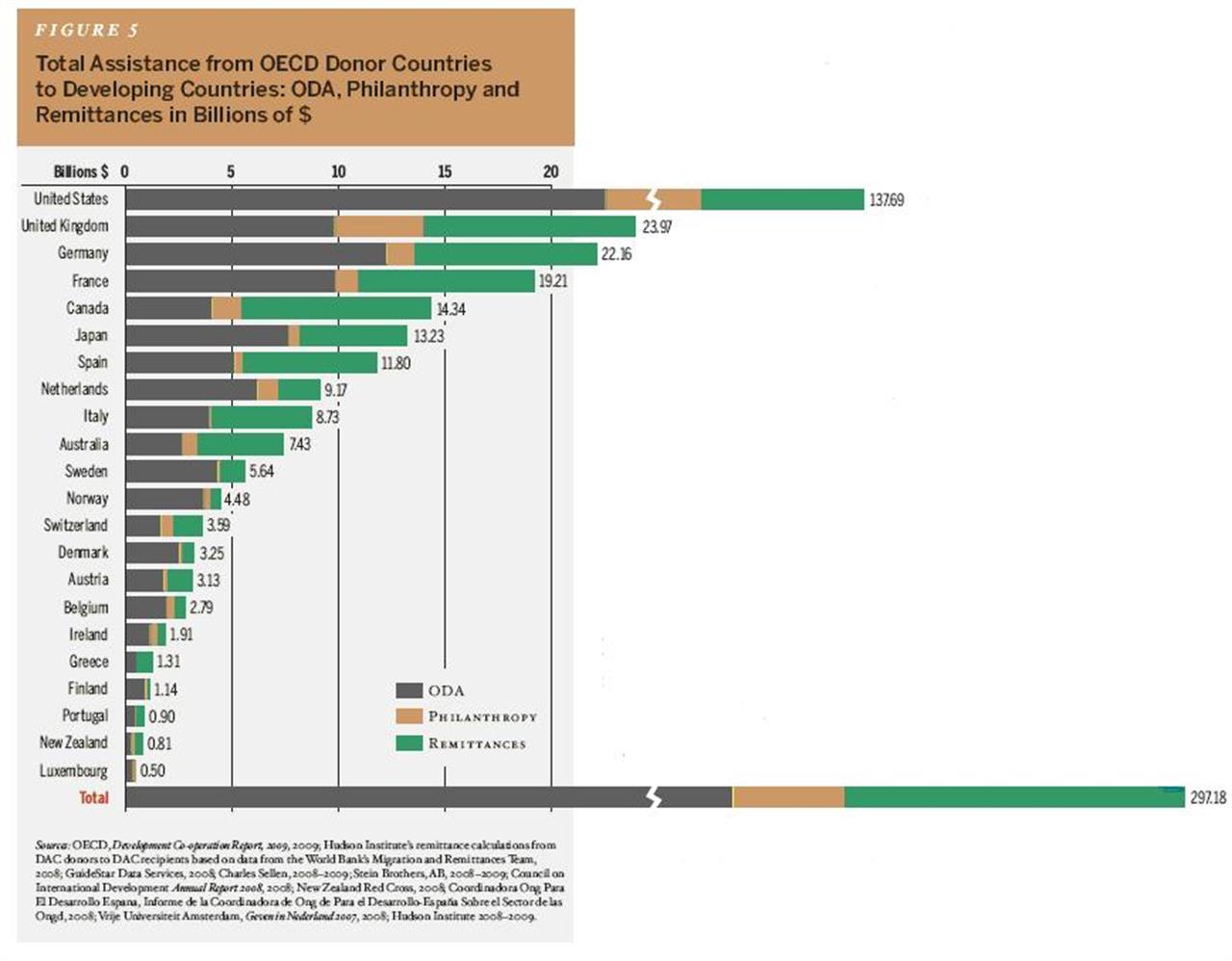Individual giving
Donations of money and in-kind donations by households have declined from 0.41% of GDP in 1995 to 0.34% of GDP in 2007 (source: www.giving.nl by the Department of Philanthropic Studies at the Vrije Universiteit Amsterdam).
In 2004, according to the Civil Society Index Reportby Civicus, 84% of the Dutch population donated to charity, and people who give on a regular basis donated, on average, 1.2% of their personal income.
The mean amount donated per household in the Netherlands in 2007 is € 270.
Average donations by native Dutch households are 277 €. Average donations by all immigrants are estimated at € 249 per household. Average donations by non-western immigrants are estimated at 211 € (source: www.giving.nl by the Department of Philanthropic Studies at the Vrije Universiteit Amsterdam).
In total, remittances and charitable donations by non-western immigrants (Surinamese, Antillians, Turks, Moroccans, Afghans were considered in the sample by the Vrije Universiteit Amsterdam; currently, about 10% of the Dutch population is of non-western origin) in the Netherlands amount to nearly 400 million euro. More than the half of this amount (approximately 60%) is being sent to countries of origin (remittances).
80% of the non-western immigrants donate to charity in the Netherlands.
Non-western immigrants who send money or goods to their countries of origin, give less often to charity.
Giving by the Surinamese bears the strongest resemblance to giving by native Dutch, both in terms of the proportion making donations and the amount donated.
The percentage of donors to religious organizations is highest among Turks and Moroccans. The average amount donated to ‘religion’ is highest among the Turks (source: www.giving.nl by the Department of Philanthropic Studies at the Vrije Universiteit Amsterdam).
Corporate giving
The proportion of corporations supporting charitable causes by sponsoring and/or donations has declined from 78% in 2005 to 66% in 2007.
Corporations have shifted their contributions from sponsoring to donations; this shift may be interpreted from a changing perspective on corporate social responsibility.
Moreover, although the majority of corporations still support charitable causes with donations and sponsorships, the proportion of corporations operating corporate volunteer programs has increased sharply. In such programs, companies organize activities in which employers contribute actively to social projects (e.g. in case of volunteers work for employers).
The term CSR is quite known by companies. About 60% is familiar with the term, 50% takes part in CSR and 15% has a CSR-policy.
A large number of companies that engage in CSR reports energy saving and environmental measures. These are indeed the most popular CSR-activities.
The attitude of companies towards CSR is quite positive, also among companies that do not develop activities (source: www.giving.nl by the Vrije Universiteit Amsterdam).
In the Netherlands, philanthropic organizations can signal their trustworthiness by conforming to the rules of the Central Bureau on Fundraising (CBF), which gives them the right to use an accreditation seal.
Donors who know about the accreditation system have more trust in charities than those who do not and give more money to charitable causes. The CBF has designed an accreditation system, to be accredited; organizations have to abide by strict rules on financial management, allocation of resources, and reporting to the public.
Giving to developing countries
Out of the approximately 9.17 billion $ (about 6.4 billion € at the current exchange rate) of total assistance to developing countries, corresponding to 1.29% of the Dutch GNI in 2007, approximately 6.22 billion $ (4.4 billion € circa) is made up from ODA (Official Development Assistance; the remaining part comes from private (individual and corporate bodies) giving and from remittances (source: Center for Global Prosperity, The Index of Global Philanthropy and Remittances 2009, 2009).
According to the 2007 edition of the biannual report Geven in Nederland produced by the Vrije Universiteit Amsterdam (2005 data), private giving estimate for the Netherlands in the category of “international aid” amounts to 742 million €. They come from five sources: households, bequests, foundations, corporations and lotteries. According to the report, households gave 439 million € to international aid causes in cash and in-kind donations; 35 million € came from bequests; 12 million € came from foundations; 168 million € came from corporate gifts and sponsorship; and 88 million € came from lotteries (source: Center for Global Prosperity, 2009).
There was a 44.5% rise in international giving in 2005 in the Netherlands compared to the average of the previous six years, and this was likely due to the Asian Tsunami (source: Center for Global Prosperity, 2009).
Si può usare la Carta docente per abbonarsi a VITA?
Certo che sì! Basta emettere un buono sulla piattaforma del ministero del valore dell’abbonamento che si intende acquistare (1 anno carta + digital a 80€ o 1 anno digital a 60€) e inviarci il codice del buono a abbonamenti@vita.it

